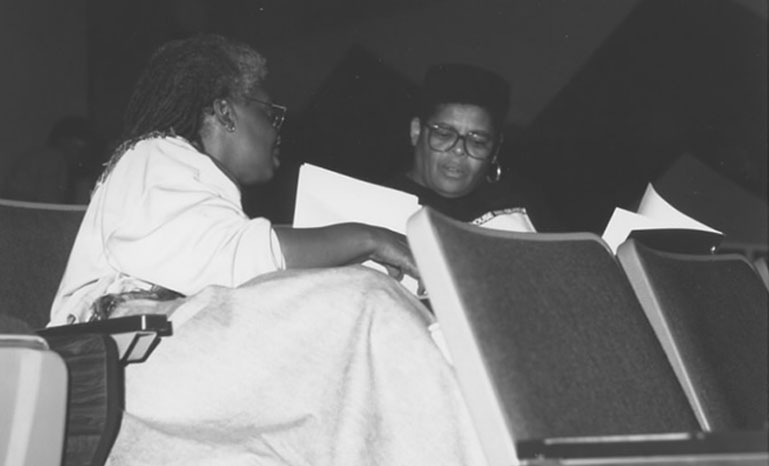Searching through the Lambda Archives of San Diego, researcher T.J. Tallie uncovered the story of Corrine ‘Marti’ Mackey, a proud Black lesbian who was popular, strong, and who shook up 1980s San Diego.
Tallie discovered Mackey while searching for what it was like to be Black and LGBTQ+ in 1980s and 1990s San Diego. He found out that Marti Mackey yielded her pen as a sword; she wrote for a local gay and lesbian publication, one of the few things that kept the community updated and informed at the time. “So, Marti Mackey was a spitfire…” T.J. Talli said of her in an interview with KPBS.
In addition to her writing, Mackey was an activist, too. She described herself as part of the “Anti-Fluff Brigade”, feeling that the media in America at the time only spoke about positive news; she felt she needed to write about the raw truth.
Mackey hadn’t lived in San Diego for very long, first visiting in 1988 when her car broke down in the city. She decided to stay after falling in love with the city and with Phyllis Jackson, an activist and a mother who worked in drug recovery programs. “They became quite a team…In a larger group together, their love story also becomes a story of activism,” Tallie told KPBS.
Later, she founded Lesbians and Gays of African Descent United (LAGADU), providing a place for people of colour who were queer. “Not only did LAGADU create a space for Black LGBTQ San Diegans to say, ‘Oh, my God, I’m both of these things,’ right? But it also really took up space in Pride and in Hillcrest in general,” the researcher said.
During a Pride parade, LAGADU held a sober space, where Mackey connected people to resources for helping with drug problems and helped people who were living with HIV or AIDS. This space also gave people a place to talk. The group also headed the 1990 Pride parade. While she was busy being an activist, girlfriend and writer, Mackey also made a play about being Black and queer in America.
In 1991, she was crowned Pride’s Woman of the Year. She reportedly did not understand why people loved her; she was called a troublemaker, which made it clear to her that she should never stop.
By 1992, her writing slowed down, appearing less and less in the publication. Fundraisers for her cancer treatment began to appear in the newspaper, taking up pages of space. At 42, Marti Mackey had died from cancer.
Tallie found a connection with her being Black, gay and 40, calling her his “historical bestie”. He believes that she would not have been pleased with his admiration. Recounting her story, he told KPBS: “She would look at me and be like, ‘All right, so what are you doing?’…‘So what are you doing? Is it, is it better?… Fixed poverty? Did it fix the AIDS? No? Still got wars? They’re still racist out here?’ And I think that then she’d be like, ‘Okay, well, then stop praising me and go get to it.’”
Marti Mackey wrote about systemic racism, structural racism, and racism and misogyny in the LGBTQ+ community. “It’s a white man’s world. Even the gay and lesbian community thinks so, especially in how they mimic him,” she wrote.
She was never afraid to call out what she knew was wrong and never afraid to combat blatant racism, once replying to a very racist letter by reviewing it: “Ummm. Not Much that’s original, or even thoughtful, here. I’ll give you a 62. It’s got some kind of a beat, but you sho can’t dance to it.”
Heroes such as Macky need to be remembered and honoured as they hold a special place in history. Although she was gone too soon, she has made an impact that should not be forgotten. She is a part of queer and Black history that cannot be swept away.
Did you know we have a team of wonderful runners taking part in this year’s Dublin Marathon and raising funds for GCN? You can support our athletes at this link.
© 2025 GCN (Gay Community News). All rights reserved.
Support GCN
GCN is a free, vital resource for Ireland’s LGBTQ+ community since 1988.
GCN is a trading name of National LGBT Federation CLG, a registered charity - Charity Number: 20034580.
GCN relies on the generous support of the community and allies to sustain the crucial work that we do. Producing GCN is costly, and, in an industry which has been hugely impacted by rising costs, we need your support to help sustain and grow this vital resource.
Supporting GCN for as little as €1.99 per month will help us continue our work as Ireland’s free, independent LGBTQ+ media.
